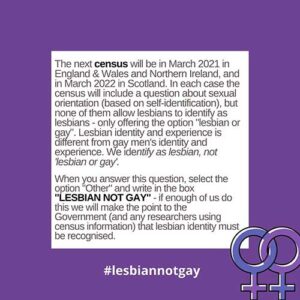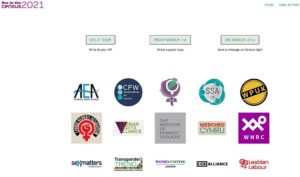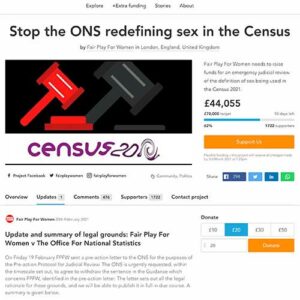For the first time the 2021 census will ask about respondents’ sexual orientation, but the options offered have angered lesbian activists says Jo Bartosch.
By 2021 one might have hoped that there would be no problem in accurately defining one’s sexual orientation in official government documentation. But at present the upcoming Census does not offer separate ‘lesbian’ and ‘gay’ categories; instead they are merged meaning that whilst bisexuals and heterosexuals are able to identify themselves clearly, female and male homosexuals are grouped together.
Online lesbian activists have argued that the “lesbian and gay experience is different from that of gay men” and that as such there ought to be space for women to define themselves as ‘lesbian’ in a distinct category.
Using the hashtag #lesbiannotgay across social media some have urged respondents to select the “other” box and write “LESBIAN NOT GAY”. Some have argued gay men completing the census may also wish to select the ‘other’ box in the sexual orientation question and write in “GAY MAN NOT LESBIAN”.
To add insult to injury, despite repeated pleas from women’s rights activists the census has fudged the category of ‘sex.’ The Office for National Statistics (ONS) who design the census, do not ask for an individual’s sex as recorded at birth, but rather for as it appears on “legal documents”. This means that respondents can refer to a government issued document such as a passport; the sex of which can be changed without obtaining a Gender Recognition Certificate. ONS guidance goes further advising respondents “it’s up to you to decide how you would like to answer each question.” In practice, this prioritises an individual’s self-declared gender identity above the reality of biological sex; it is ‘gender self-identification’ by stealth.

In response campaign groups have launched the website sexinthecensus.org with details about how to “take simple action to take part in the census, whilst also sending a clear message to the ONS.” Signatories include established groups like Transgender Trend, LGB Alliance and FiLiA, as well as more newly formed groups Lesbian Labour and the Authentic Equity Alliance.

On Valentine’s Day feminist activist Maya Forstater held a poetry competition on Twitter to raise awareness of the problem of basing the category of ‘sex’ on official documents. The winning entry read:
“My heart’s in a flutter
My emotions are reeling
For my dear ONS
Hates facts but loves feelings.”
In the meantime Fair Play For Women (FPFW) is raising funds for an emergency judicial review of the definition of sex being used in this year’s census. After obtaining expert legal advice the group believe the ONS has acted unlawfully. ONS will be invited to back down and withdraw the offending elements of the guidance accompanying the sex question. FPFW will be applying for an expedition order in the High Court for an emergency judicial review. The group urgently needs to raise £70,000 in two weeks to cover the legal costs. They will need to seek a trial before the census takes place on 21 March. More details at crowdfunder.co.uk/sexinthecensus2021

As the first step toward an urgent Judicial Review, on Friday 19 February FPFW sent a letter to the ONS requesting the removal of a sentence reading: “If you are considering how to answer, use the sex recorded on one of your legal documents such as a birth certificate, Gender Recognition Certificate, or passport”.
“Sex is an important predictor of outcomes across all areas of life, including education, wages, crime, and physical and mental health… If we do not monitor sex differences, we cannot tackle sex discrimination.”
For 220 years the ONS has included a question on sex. They explain this is to “identify discrimination or social exclusion based on sex, and work to stop it from happening.”
University College London sociology professor Alice Sullivan, who believes the census ought to record biological sex accurately, said: “Sex is an important predictor of outcomes across all areas of life, including education, wages, crime, and physical and mental health… If we do not monitor sex differences, we cannot tackle sex discrimination.”
Over recent years the numbers of people identifying as trans have increased significantly; in 2017 the Government Equalities Office put the numbers at between 200,000 and 500,000, possibly approaching one per cent of the adult population. Arguably, the inclusion of an optional question about ‘gender identity’ is an appropriate way to address this, but critics note the question of gender identity is only relevant if the data about sex is based on biological reality not legal documents which can be changed with relative ease.
As Lynne Harne of the Lesbian Rights Alliance (LRA) says: “The LRA are shocked that the census has not defined the sex question based on natal sex, but on legal documents. The sexual orientation question should also have had separate categories for lesbians and gay men. Both the sex and sexual orientation questions will disappear lesbians and the data provided will be meaningless.”
The ONS should have been able to predict the response to their decision to allow sex self-identification. In December 2019, 80 of the UK’s leading social scientists wrote to the UK census authorities to express concern about guidance advising respondents that the answer to the sex question be self-identified rather than based on biology. As it stands the design of the census marginalises lesbians, makes those who identify as transgender invisible and corrupts the data on sex.
























Great piece. Thank you.